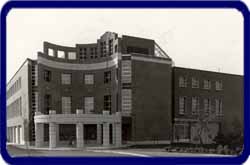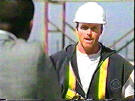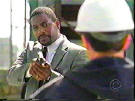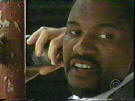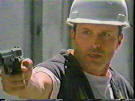OUTSIDE
MACNAUGHTON HALL - MONDAY MORNING 8 AM Richard
Kimble is seen walking toward the auditorium. Approaching the door, he is
shocked to see a wanted poster bearing his picture on the main door,
advertising the trial. He tenses and bends down to tie his shoelace as two
students come up behind him. Immersed in their own conversation, they ignore
him. “Lucky
you, to be cast as Matthew Ross. Now there’s a role you can sink your teeth
into! All I get to do is play a jogger!” “Yeah,
but you don’t have to put on all the make-up I do to look like a 60-year old
man! Can you help me with the clay on my face? I always have trouble getting it
to look right!” “No
problem!” As
the students walk around him to go inside, Kimble looks around anxiously, then
follows them cautiously down the hallway. 30 MINUTES LATER The
two students emerge from a small room. One of them now looks remarkably like
Matthew Ross. The other now has a mustache. Kimble
watches them walk down the hall, then enters the room, shutting and locking the
door. He sifts through the make-up on the table before going to work. He deftly
applies the make-up to make his hair appeared sprinkled with grey and uses glue
to apply a full gray beard. Grabbing a flat cap, bulky coat and cane from among
the stage props, he cautiously leaves the room, walking now with a slight limp. As
he nears the entrance to the auditorium, he approaches a tall black man
confronting a blonde woman and walks past them at a discrete distance, unable
to avoid hearing their conversation. “Captain Gerard, what a surprise to see you
here! I would have thought you were too busy trying to catch my brother-in-law
to waste your time here.” Becca Ross challenges
Gerard with a satisfied smile. “I’m
here to see that justice is done, Ms. Ross. And it will be. Again!” Becca throws him an angry look and brushes past him into
the auditorium. Kimble
hesitates inside the doorway upon hearing the name Ross and glances at the
blond woman as she walks past. The black man follows her, too angered by the
confrontation to notice Kimble as he moves away along the back wall of the
courtroom and slips into a seat in the back row by the exit door as the
prosecuting attorney rises. “Members
of the jury, Richard Kimble stands accused of the brutal murder of his young
wife, Helen Ross Kimble. The prosecution will prove to you that Dr. Kimble was
the only person who had the motive, the means, and the opportunity to commit
this heinous crime.” “Dr.
Kimble had the commonest motive of all - simple greed. His young wife had just
inherited $20 million from her mother’s trust fund, a legacy that the
cash-strapped, debt-ridden young doctor was well aware of when he became
engaged to his future wife.” “We
will present evidence that Dr. Kimble was the only person in their apartment
that night. More than that, we will show that this was not a simple crime of
passion, but a well-thought out plan to marry an heiress and then kill her
weeks after she received her inheritance. It was no coincidence that another
runner saw the couple in the park fighting that day. It was no coincidence that
Dr. Kimble faked an ankle injury so he could stop to buy his wife a rose to
establish an alibi. It was no coincidence that the murder weapon, a baseball
bat, was there in the bedroom when he arrived home to surprise his wife. And it
was no coincidence that Dr. Kimble delayed calling 911 until he was certain she
was beyond saving.” “The
defense will attempt to blame the murder on a fictional one-armed man who was
in the apartment that night. But, ladies and gentlemen of the jury, there is
not one shred of evidence to support their argument. No blood or fibers other
than those belonging to the accused and his victim, no evidence of a break-in,
and no witnesses to the presence of a one-armed man in the apartment or indeed
in the city.” “When
you have reviewed the evidence, we are confident that you will find Dr. Kimble
guilty of murder in the first-degree.” With a self-assured manner, he returns
to his seat as the defense attorney rises to face the jury. “Members
of the jury, Richard Kimble is innocent of this crime. He did not kill Helen
Ross Kimble. The defense will prove that the prosecution’s case is all
circumstantial. The prosecution has told you that Richard Kimble’s main motive
was greed. However, we will show that Richard Kimble did not have any interest
in Helen Kimble’s money.” “We
will show further that the witnesses are not completely credible. We will show
that the forensic evidence is flawed. We will show that the coroner’s report is
not accurate. Lastly, we will present evidence to show that the One Armed Man
does indeed exist and had probable cause to be in the Kimble apartment the
night that she was killed.” As
the defense attorney sits down, the judge turns to the prosecuting attorney.
“You may call your first witness, Mr. Young.” “Your
honor, I call Matthew Ross to the stand…” Kimble
watches as the drama student he saw earlier steps confidently up to the stand
and is sworn in. “Mr.
Ross, Helen Ross Kimble was your daughter, is that correct?” “Yes.” “Can
you tell us about the trust fund she received?” “The
trust fund was a part of my father-in-law’s estate. The money was to be held in
trust until the 32nd birthday of our children, at which time full control of
the fund would be turned over to them.” “An
odd age.” “My
father-in-law wanted the children to have the opportunity to build their lives,
independent of great wealth.” “Approximately
how much was the trust fund worth?” “In
excess of $20 million dollars.” “How
old was your daughter when she died?” “She
turned 32 one month before…she was murdered.” “I’m
sorry, Mr. Ross. And her husband received the contents of the trust fund at her
death?” “Yes.” “Mr.
Ross, was Dr. Kimble aware of this trust fund before your daughter’s death?” “Yes.
She told him about it before they were engaged. I begged her not to.” “Why
was that?” “Isn’t
it obvious? That kind of money would attract every kind of fortune seeker. And
it did!” Ross said emphatically, staring at Dr. Kimble with hatred. “Mr.
Ross, is it true you encouraged your daughter to sign a pre-nuptial agreement?” “Yes.” “And
did she?” “No!
Kimble refused to sign one.” “And
how did your daughter feel about that?” Ross
laughs bitterly. “She said she didn’t need one, that when you truly love
someone, you don’t need to worry about things like that. She was wrong!” “No
further questions, your honor. Your witness,” Young says, nodding at Mr.
Williams as he takes his seat. The
defense attorney confronts the witness. “Mr.
Ross, is it correct that you never approved of Richard Kimble?” “I
always saw him as an opportunist. Helen had begun dating someone in my company
who came from a very distinguished background shortly before she met Kimble.
After she started dating him she stopped seeing the other young man.” “Why
was Dr. Kimble an opportunist in your mind? He worked his way through college
and medical school. He was a highly respected physician at Chicago General
Hospital. This is the kind of man most parents dream of for their daughters to
marry.” “Dr.
Kimble was heavily in debt with student loans, and could only afford a modest
apartment near the hospital. What’s more, he had no interest in taking
advantage of legitimate means to better himself. I offered to use my influence to help him get a higher
paying position in the hospital administration, but he refused. He said he
preferred to work directly with patients.” His tone of voice makes it clear
that Ross feels this is a foolish decision. “So he refused your help?” The attorney pauses
to let the implication sink in for the jury before continuing, “And because Dr.
Kimble lived in a modest apartment and was paying on student loans, you
considered him an opportunist? Do you have any idea how much it costs to go to
medical school, or law school for that matter? I’ll answer for you, Mr. Ross, a
lot! As a matter of fact, I find myself in the same situation as Dr. Kimble.
Would you say that makes me an opportunist?” he finishes heatedly. Prosecution
says, “Objection your honor, the question is irrelevant. The defense is
badgering the witness.” Judge
replies, “Sustained. I suggest you control yourself, Mr. Williams.” Williams
takes a deep breath to regain his composure. “I apologize, Your Honor. I have
no further questions for Mr. Ross, but I do reserve the right to recall him
when the Defense makes their case.” The
judge answers, “That is fine. Mr. Ross, you may step down but you will be
recalled to the stand again tomorrow. Next witness.” As the drama student steps
down with obvious relief, the judge turns to Young. “Your
honor, I call Mr. James Wingard to the stand.” “Mr.
Wingard, is it true that you saw the defendant and
his wife in the park on the day of the murder?” “Yes
sir!” “And
what were they doing?” “They
were jogging, side by side. Then she started to run away from him. He chased
her and grabbed her and knocked her to the ground.” “Thank
you, no further questions.” Attorney Williams rises and approaches the stand. “Mr.
Wingard, how far away from the Kimble’s were you when
you saw Dr. Kimble and his wife?” “About
100 yards away.” “100
yards away? Did you hear anything that was said between them?” “No.” “Did
you hear any shouting at all from Dr. Kimble?” “No.” “Did
you hear Helen Kimble shout for help or give any indication that she was in
need of assistance of any kind?” “No.” “Did
you see Dr. Kimble raise his hand to her like he was maybe going to hit her?” “No.” “Mr.
Wingard, are you married?” “Yes.” “Have
you never chased your wife around the house just for the fun of it?” There is
laughter in the audience. Attorney
Young rises. “Objection, your honor! That question is irrelevant!” “Sustained.” “I
withdraw the question and I have no further questions for this witness.” Judge
says, “The witness may step down.” The
prosecution calls its next witness. “Dr.
Jones, would you state your occupation please.” “I’m
the coroner for the city of Chicago.” “And
you performed the autopsy on Mrs. Kimble?” “Yes
I did.” “Could
you tell us the results of that autopsy?” “Mrs.
Kimble died from severe trauma to the head, caused by multiple heavy blows from
a blunt instrument.” “Like
a baseball bat?” “Yes,
that would be consistent with my findings.” “And
could you tell anything about Mrs. Kimble’s attacker from the autopsy?” “The
location of the blows indicated her attacker was about 6 feet tall, and
right-handed.” “Your
honor, I would like it entered into the record that Dr. Kimble is 6’1”and is
right-handed.” Mr.
Williams rises. “Your Honor, I request permission to approach the bench.” “Permission
granted.” The
defense attorney and prosecuting attorney approach. The defense attorney says,
“Your Honor, it has recently come to my attention that Dr. Jones, who did the
autopsy on Helen Kimble and testified at the original trial, is now deceased.
An amended coroner’s report has since been filed by Dr. Alexander, who was
initially going to do the autopsy on Helen Kimble. I’d like it entered into the
record that Dr. Jones is now deceased and I will be calling Dr. Alexander to
testify on behalf of the defense tomorrow. The prosecutor is welcome to look at
this evidence for cross examination purposes.” The
prosecutor, looking very inquisitive says, “I have no problem with this Your
Honor.” “Very
well, do with this particular witness what you want.” The
defense attorney and prosecutor take their seats and the defense attorney says,
“I have no questions for this witness, Your Honor.” The onlookers in the
courtroom look at him in stunned surprise, all except Kari, who wears a small
knowing smile. The look does not escape Kimble, who looks at her with a puzzled
frown. As
Williams sits down, Attorney Young turns to the judge. “Your
honor, I would like to play the recording of the call received by 911 on the
night of the murder.” “Proceed.”
There is silence in the auditorium as the audience listens to the recording. Dispatcher: “9-1-1. What is your emergency?” Kimble: “My wife. Someone broke in and
attacked her.” Dispatcher: “Is this the Kimble residence?” Kimble: “Yes…yes! I can’t get her to
breathe again! Oh my God, Helen!” Dispatcher: “Stay on the phone with me, sir.
I have help on the way right now. Tell me what happened.” Kimble: “We were jogging. I twisted my ankle and Helen ran on ahead. When I
got home, a man attacked. We fought. His
arm came off. It was prosthetic. I could have had him, but Helen.. I had to
help Helen.” Dispatcher: “Dr. Kimble, is your wife still breathing?” Kimble: “No….” Sobs are heard in the background. Dispatcher: “Dr. Kimble, help is on the way and they should be there soon. Stay on the phone with me, okay?” Kimble: “You have to catch the man who did this.” Dispatcher: “Do you still have the prosthetic arm?” Kimble: A long pause. “I can’t find it.
He must have taken it with him.” Dispatcher: “Okay, I’ve been told the police are outside right now.” (Just then knocking can be heard in the
background). Kimble: “Thank God, they’re here.” Dispatcher: “Okay sir, I will let you go now.” As
it plays, a clearly agitated Kimble glances at the people on either side of him
as he tries to control his emotions. Captain Gerard turns around to scan the
audience, but his attention is drawn back to the front of the courtroom as the
recording finishes. “Your
honor, I call Captain Philip Gerard to the stand.” Gerard
stands up and strides up to the witness stand. There is a murmur as he is
recognized by some members in the audience. Kimble stares at him, sensing he
should know him, but unable to summon any memories. “Captain
Gerard, it is a pleasure to have you in the courtroom today. Unlike our other
witnesses, who are merely playing a role, you were involved in the actual
event.” Gerard
responds with a smug nod. “Would you tell us in your own words what happened
the night of Helen Kimble’s murder?” “I
received a call from the dispatcher at 8:42 PM. I proceeded immediately to the
Kimble apartment.” “And
what did you find there?” “Mrs.
Kimble was lying fully clothed on the floor of the bedroom. Her head had been
battered and she was lying in a pool of blood. She was not breathing. Attempts
by the paramedics to revive her were unsuccessful. Dr. Kimble refused to allow
her to be taken to the hospital to be intubated.” “Is
that normal procedure?” “Yes,
but in this case, a physician was present. Dr. Kimble stated that his wife had
not been breathing for too long for the procedure to be successful. He said he
did not want her body subjected to the procedure needlessly. The paramedics
informed me that rigor mortis was setting in and that the procedure would be
useless.” “What
else did you find in the apartment?” “We
found a bloodied baseball bat lying on the living room floor and clear evidence
of a violent struggle. I immediately sealed off the crime scene and began to
collect evidence.” “And
what evidence did you find?” “Despite
Dr. Kimble’s statement about a one-armed intruder, we found no evidence of a
break-in, and no evidence of any kind that there was anyone in the apartment
that night other than Dr. Kimble and his wife.” “And
you did a very thorough search, did you not?” “Yes,
we returned twice to collect dust and prints. I also made an exhaustive search
for a anyone matching Dr. Kimble’s description of a one-armed man. I found no
evidence of such a man anywhere in the vicinity of the Kimble residence that
night or any night.” Kimble
stares at Gerard on the witness stand with a feeling of deja
vu. Suddenly he remembers the confrontation at the top of the construction site
in Miami. “The man who killed my wife
is in Miami.” “Yeah, and I’m looking at him.” “I will not stop. Ever.” “Neither will I.” Kimble
instinctively crouches down in his seat. Gerard, as if sensing his fear, pauses
in his testimony to scan the audience. Kimble looks for an opportunity to
escape. As the prosecuting attorney gets Gerard’s attention once more, Kimble
notices the young woman beside him look at her watch and rise to leave.
Pretending they are together, he quietly follows her out the exit door. With a
seemingly casual glance back, he sees Gerard is leaving the stand. He turns
quickly toward the main entrance, and collides with Agent Holmes, almost
knocking her down. With a muttered apology, he takes her hand to steady her.
Their eyes meet and a burst of static electricity passes between them. Stunned,
Kari looks at him harder and realizes it's Kimble. "Richard!" she
says softly. Kimble sees her badge and gun and immediately turns and runs down
the hall. Behind him, Kari stares after him. Her expression changes from
startled to confused as Kimble shows no sign of recognition. She starts to run
after him, when she is stopped in her tracks. “Agent
Holmes. Is anything wrong?” She
turns to face Gerard just as Kimble glances back at her, then disappears around
a corner. Masking her feelings behind a poker face, she moves toward Gerard to
distract him. “No sir, I just came out for a breath of fresh air. What
happened? I thought you would still be on the stand.” “I
left early. The prosecutor has rested his case, but the defense is stalling,
claiming they received some last minute evidence and need time to evaluate it.
This mock trial is real in that respect, lawyers wasting everyone’s time.” Anxious
to get away from the campus, Kari counters, “In that case, let’s go back to the
hotel. I had some documents faxed to me yesterday for the profile I’m working
on. At least I can accomplish something!” “What
profile is that?” “Ben
Charnquist. You asked me to work on it, remember?
Like it or not, he's involved in this.
I’ll get my things.” She turns and heads back into the courtroom without
waiting for his response.